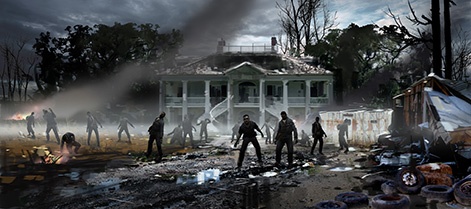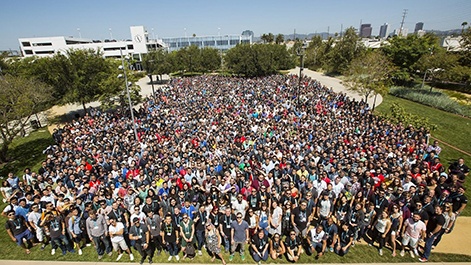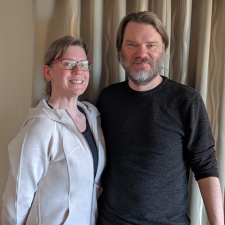At GDC, Valve alum Chet Faliszek (far right) and Riot vet Dr Kimberly Voll (right) revealed that they had set up a new Seattle-based studio, Stray Bombay. This new venture is focusing on co-op games and is backed by both VC firm Upfront Ventures and League of Legends maker Riot Games.
Ahead of the announcement, PCGamesInsider.biz caught up with the development duo to see why they've set up this new development house, how AI could be used to improve co-operative games and what they have learnt from their times at Riot and Valve
So, why start this studio?
Chet Faliszek: Kim and I have been talking about co-op games in particular for years and so we wanted to really just approach the problem from the ground up. It's not just the moment-to-moment; it's everything and just making sure we carry all the way through on co-op games. So we wanted to start a studio that made co-op games.
Dr Kimberly Voll: That's basically it. We've had a chance to work on a lot of different cool products over the years and learn a lot of things and whatnot. This was just a really cool opportunity to just start from the very beginning, from how we think about the studio itself to the products that we're making and so on.
You mentioned a 'problem' in co-op games, Chet. What do you see the problem as?
Faliszek: I love co-op games; I've worked on some. I always play any co-op game. A lot of the time, co-op is an afterthought or they do a lot of things that actually work against the players so they're not actually working together. We just really wanted to go back and make a game that's co-op focused that is broad and encompassing of the audience for it, that's not super hardcore and you can play with a really mixed skill set.

Both of you have specialised in AI and how it can be used in game design. How do you see this tech impacting the co-op genre?
Voll: It's part of the overall holistic design. It's more like a facilitation role. You can think of the AI as a service that is working to understand and track what is going on in the game on behalf of players and take interesting pieces of information, about how the team is doing and the signals that you can pick up: Is the team being successful? Are they having a hard time? Is there a lot of disparity in terms of how everyone is doing? What experiences have they had in the past? You can fold all of those things together into a cohesive piece that supports the overall narrative. The intent is never to be front and centre; the intent is for it to support and really enhance the overall experience; this feeling of being together with your friends in this space going on this adventure.
That sounds very much like an extension of Left 4 Dead's Director AI, which dynamically changed difficulty and pacing for players.
Faliszek: Yeah. If you take that really far and go: 'Okay, if you are in a team of four and you've now played five games together, we know what those five games were like. We can do something crazy in the sixth game that we couldn't do before because we didn't know what had happened before'. Most games keep you in a certain level of experience because it doesn't know how you are doing. All of sudden, if we know we've kept the player at a certain level for a really long time, we can give them a game where we go really broad and crazy and see how they do, and then bring it back in for the next one. There's a lot of playing we can do if we know the users for a really long period of time and not just in those sessions. In individual games, that has to be honed and we have to do a lot of that dynamic pacing because you can't just always be shooting; you've got to break it up and we have a lot of thoughts on that. But also doing it outside of the moment-to-moment game experience is important, too.
Voll: You have a story and a shared history with folks, that's actually meaningful and we can actually pour that into the game to enrich the experience as well.
Co-op is an afterthought for a lot of studios. They do a lot of things that actually work against the players so they're not actually working togetherChet Faliszek, Stray Bombay
Right now, Stray Bombay is just the two of you. How big do you want to grow the studio?
Faliszek: One of the big things about making games is culture and process. For us, our culture is about keeping the studio on the small side. To ship is 20-to-30 people, all in the same location and that's where you can have everybody on the same page, everyone knows what's going on, all staff understand why we're doing what we're doing. You do that by keeping the studio company small and just being transparent with everybody.
How early into development are you on a project?
Faliszek: Before we even started, I had a version of the prototype in Unity and Unreal, so people could jump in and look at it already - and that was just me. We know the direction we're going. As people join the team, that'll help find the game more clearly. We're very iterative, everyone is a designer, everyone participates in the process. We're here at GDC to hire. Everyone joining will have a big impact on the project. Obviously, we have a plan, there's a framework that we can hang it all off, but everyone will be able to express themselves and have an impact.
What's your pitch for staff to come work at Stray Bombay?
Faliszek: We're looking for senior developers; come join because not only will you have an impact, not only will you be part of the company and not just in your role, but you'll also share the success of the company. Everybody has to have an equal footing and that feeling of impact where they're all part of it together and they understand every choice being made so that they can then make the best game. That also means us stepping back. We're paid the same as everybody else, we're sharing profits more than equity sharing, and that's how we get paid as well. Long term, that's way more beneficial than trying to gather some kind of money upfront on that.
Voll: Equally, we think there's a chance to really step back and take another look at how people actually relate to each other digitally and in the context of games and bring that to what we want to make. We're looking for people that are equally passionate about those sorts of problems and we want to take a chance on a different kind of game that we think is really right for where we're going as an industry.
You have a story and a shared history with folks, that's actually meaningful and we can actually pour that into the game to enrich the experience as wellKimberly Voll, Stray Bombay
You have both worked at companies whose working and corporate cultures have seen a lot of attention, both good and bad. What have you taken away from your time at Valve and Riot and how has this informed any potential culture at Stray Bombay?
Voll: Culture is a hard problem for any of us. It's super hard at a large scale; everyone has their own interpretation of what the culture is, so you end up with folks where if that culture is never really tested, then you never really know what the gap between how I have interpreted it versus how someone else has. You see it; something happens that challenges your culture and suddenly all those differences of interpretation bubble up and it creates a load of tension. There's that high-level piece that's really and makes it extra challenging. And let's face it: we've got a ways to go as an industry in general. I have a lot of love and respect for Riot and the fact that the company has been really stepping back and going: 'Okay, we have some things to work on, let's listen and understand - we don't have all the answers'. It's been a lot trying to learning. What's important moving forward is that all of us are actually working together to address these issues and supporting one another because we have a long ways to go. Us starting a new company and talking about culture; we're not saying we have all the answers. We've been able to grow and learn; we're a product of those learning experiences. This is a way for us to carry this forward and hopefully share back so that we're all supporting one another as an industry.
Faliszek: For Valve, it was the greatest place I could have ever gotten to work. The opportunity and learnings I got there, just sitting back and learning. I joined the VR team - I didn't know VR and was actually a sceptic - but the first three months I worked on that team, I did nothing but sit back and listen to other people give demos and soak it all in and try to understand it. I don't know many places that would just offer you that kind of on-the-job education. That's actually how I met Kim originally, hearing her talk. Some of what we'll take to our company definitely comes from that; the idea of not having titles so you don't pigeon hole somebody so that they can move around from space-to-space, that you can try things, that you can fail at something and go: 'Oh, I'm not actually good at that'.
In your announcement press release, you name Upfront Ventures as your financial backer. What kind of support have you received from them?
Faliszek: They were really supportive to make sure that we have enough runway so that we can launch our game. Kevin Zhang is a partner; he approached me about helping us out. Upfront shares our long-term vision; we're not doing this for the next five years, we're doing this for the next 15 years - what does that look like? Just saying that this could take time and that's okay, as long as we're always transparent about what's going on, so long as we're always learning. They were really supportive of that.

Are you looking for further investment?
Faliszek: It's Upfront and, actually, Riot Games. So no, we're not looking for further investment. We're ready to hit the ground running and go. One of the things that was important for me before we started really reaching out and doing a larger hiring process was making sure that if we're inviting someone to come join us, that there's a safety for them; that they know that if they come here, we'll ship a game, that we've got the funds for that and that's lined up. I couldn't go to people and ask them to leave their safe job to come work for us until we had that lined up. That was really important for us.
What sort of ratio is Upfront's investment compared to Riot's?
Faliszek: Upfront is leading the round; they're the main investor.
Voll: Riot has just joined.
Say we're speaking in two or three years time. What's the ambition for Stray Bombay in that time?
Faliszek: Two or three years down the line... we hope to have released a great co-op game. People are playing it.
Voll: Getting lots of good feedback but generally speaking, people love it. We're playing it all the time. We're looking down the line at all the updates that are coming down the pipeline, maybe there's a twinkle in our eye about the next one.
Faliszek: And maybe one of our senior people is looking off at something they want to do and we're able to support them doing that.
Voll: First and foremost, we want to make an awesome game. That's the most important thing here. But if we're successful in doing that, then it's this opportunity to pay it forward and support the studio and the industry in general.
Faliszek is going to be speaking at the forthcoming PC Connects Seattle 2019, which is taking place on May 13th. Tickets can be bought here













